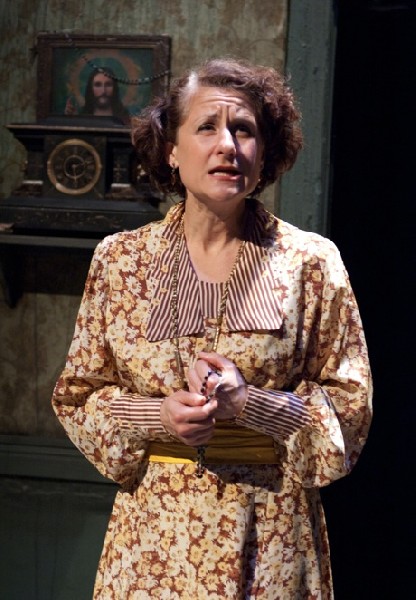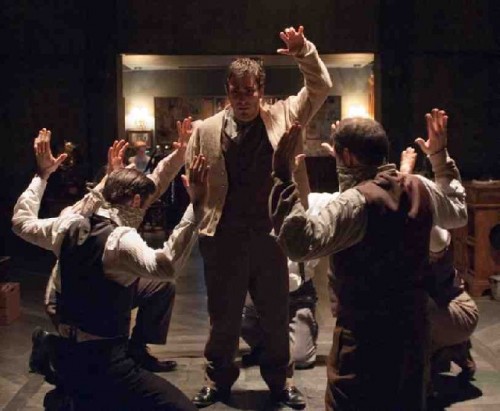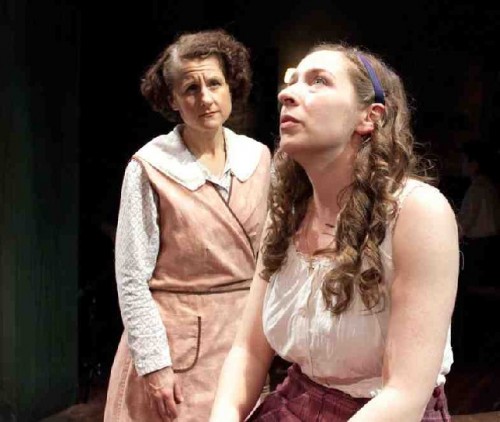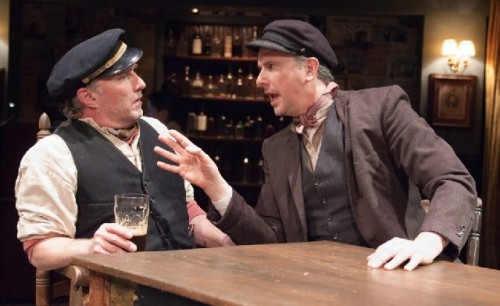Juno at the Timeline Theatre, Chicago
O'Casey to Stein to Blitzstein, A Compelling Musical
By: Susan Hall - May 09, 2014
Juno
Book by Joseph Stein
Music and Lyrics by Marc Blitzstein
Based on the play Juno and the Paycock by Sean O’Casey
Timeline Theatre
Directed by Nick Bowling
Emily Glick (Mary Rose) Marya Grandy (Juno Boyle) Ron Rains (Captain Jack Boyle), Jonny Stein (Johnny Boyle), Jordan Brown (Jerry Devine), James Houton (Joxer Daly), Peter Oyloe (Charlie Bentham), Caron Buinis (Mrs. Brady), Anne Sheridan Smith (Mrs. Madigan), Kelli Harrington (Mrs. Tancred) Kathleen Gibson (Miss Quinn), Andy Robinson (Foley), Peter Spita (Policeman and others), Matthew Keffer (Policeman and others), Michael Reckling (IRA singer and others), Paddy Homan (recorded Irish tenor).
Doug Peck and Elizabeth Doran (Music Direction), Katie Spelman (Choreography), John Culbert (Scenic Design), Alex Wren Meadows (Costume Design),
Timeline Theatre, Chicago, Il.
Thru July 27, 2014
Photos by Lara Goetsch Courtesy Timeline Theatre
Juno, the musical by Joseph Stein and Marc Blitzstein based on the Sean O’Casey play Juno and the Paycock, is playing at the Timeline Theatre in Chicago through July 27th. It is a grueling delight.
Timeline’s mission is to bring history to life in the present. This work is set in 1921 Ireland, after the end of the war with Britain and at the beginning of the domestic wars. But for the lilting, lyrical Irish brogue, we could be in the Ukraine, Syria, Afghanistan or Nigeria today. Brother turned against brother in a battle on the homeland. Ireland 1921 was just such a moment in time.
Smart people in musical theatre start from a powerful play. Joseph Stein had been overwhelmed by the power of Juno and the Paycock, and thought its language and story “bursting with humor and wit and drama" would be perfect for a musical. He went to visit O'Casey with a tape of My Fair Lady in hand.
O’Casey had nothing to play My Fair Lady on, but was jealous of GB Shaw’s financial success, so he signed for the exclusive musicalizing of his play. He told a friend that he did not expect Don Giovanni or Boris Godunov, but knew it could be made be a seed pearl of loveliness.
Blitzstein was attracted to the play‘s working class characters, the blend of comic and tragic elements and a central female protagonist who grew in social consciousness by the play’s end. Juno rings true today as women still struggle for their place in the sun.
Writing to O’Casey, Stein noted, “Marc has completed a good part of the score….the songs are tuneful and charming, and most important, in character with the people, the locale and the story…The plot of identical and builds, exactly as it does in the play, to the same climax….”
Ensemble singing is woven throughout. Juno introduces four gossips who serve as a commenting chorus. O’Casey accepted them writing: “I think the musical should be brighter in spirit and look than the play, for it is another form and actually a different work… but mind you don’t go too far and make it too gaudy.”
Stein and Blitzstein did not. This is probably the reason this first rate piece of musical theatre has languished unproduced over the years. Victoria Clark made a superb Juno in an Encores reprise at City Center in New York, but no transfer discussions transpired after a really first rate rendering. Juno is dark, but Timeline has found its lifefulness.
O’Casey knew the magic of a theatrical moment took a combination of humor, tragedy and waiting wrapped up on the stage. With a score that matches, underlines and highlights character, all the performers in this Timeline production etch out their roles moving seamlessly from the spoken word to the sung and then on into a flight of fancy in dance. That's no small task.
Nick Bowling has directed a mix of the specific and the cultural context. The set by John Culbert uses the Timeline theatre to maximum advantage, combining interior and exterior in one space. Culbert places the Boyle children's rooms right in the middle of the audience, so we are living with the family as well as watching them.
The beautiful voices often referring to Irish songs in the Blitzstein score takes you right to Dublin 1921. Violence and danger is palpable. So is poverty, love and life.
The O’Casey language is not only respected by the musical's creators, but is left largely intact in the dialogue and witty lines. The language itself is filled with the melody: Vowels elongated. A glide in pitch.
Blitzstein composed the work, with pauses for dialogue and arias. Sondheim's similar style had not yet emerged.
Dance choreographed at one time by Agnes de Mille is now brilliantly staged by Katie Spelman. A particularly stunning number is a dream sequence in which young Johnny falls apart. Whirling with one arm in a nightmare of twists, Johnny Stein creates the madness of the moment.
The ensemble characters are varied. A barbershop quartet bursts forth. Four harpies deliver the gossip with verve.
In a cast where each character is painfully and carefully drawn, James Houton as Joxie stands out. He walks weaving bow-legged and tips with dipsomania or just because he is truly obnoxious and irresistible.
In the original Broadway cast, Shirley Booth and Melvyn Douglas played Juno and her paycock husband, the Captain. Neither of them could sing as well as Rex Harrison. Throughout Timeline’s cast has wonderful singers. Emily Glick, the daughter Mary who falls for an insipid dandy, has an enviable top. Her love songs are lush, and she wraps gorgeous tones around poignant lyrics. “I Wish it Were So" which reveals her deep unrest. Jordan Brown as her rejected suitor has particularly sweet arias like “One Kind Word.”
Marya Grandy, plain and bustling at the start, blossoms as she prepares to leave the trap of her life. Peter Oyloe struts his stuff as the posturing Charlie, too weak to face the consequences of his actions. His duet with Mary, "My True Heart," is a heartbreaker.
The Captain brought to life by Ron Rains is is a lively drunk, who prefers not to go to work. Juno allows him to stay home when it is announced that he will inherit a fortune. Being an Irish optimist, he spends his inheritance before it arrives, and this being O’Casey, you can imagine the outcome: a moving and engaging evening of theatre.






